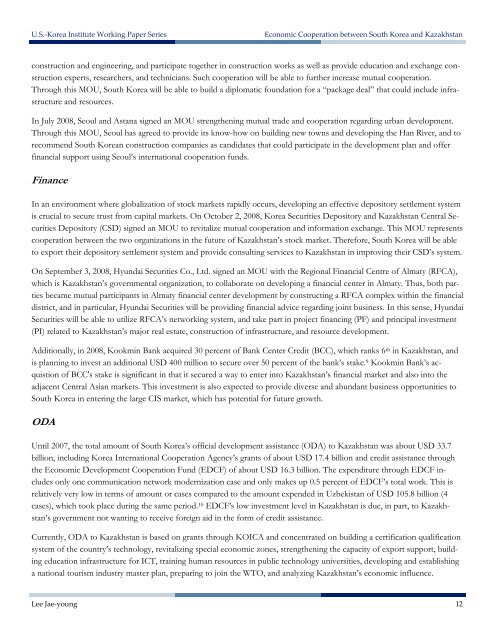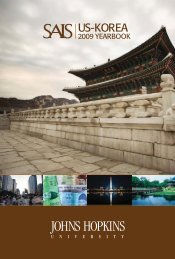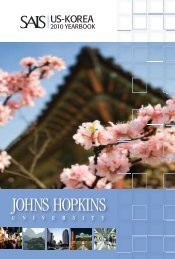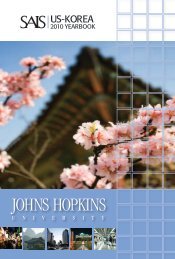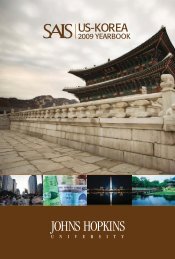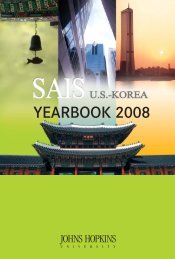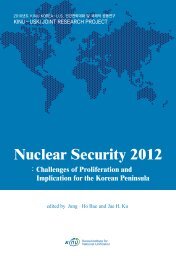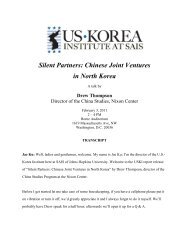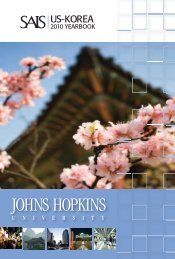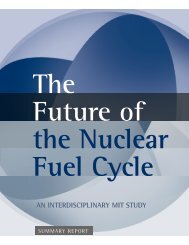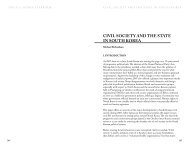U.S.‐<strong>Korea</strong> Institute Working Paper Series<strong>Economic</strong> <strong>Cooperation</strong> <strong>between</strong> <strong>South</strong> <strong>Korea</strong> <strong>and</strong> <strong>Kazakhstan</strong>construction <strong>and</strong> engineering, <strong>and</strong> participate together in construction works as well as provide education <strong>and</strong> exchange constructionexperts, researchers, <strong>and</strong> technicians. Such cooperation will be able to further increase mutual cooperation.Through this MOU, <strong>South</strong> <strong>Korea</strong> will be able to build a diplomatic foundation for a “package deal” that could include infrastructure<strong>and</strong> resources.In July 2008, Seoul <strong>and</strong> Astana signed an MOU strengthening mutual trade <strong>and</strong> cooperation regarding urban development.Through this MOU, Seoul has agreed to provide its know-how on building new towns <strong>and</strong> developing the Han River, <strong>and</strong> torecommend <strong>South</strong> <strong>Korea</strong>n construction companies as c<strong>and</strong>idates that could participate in the development plan <strong>and</strong> offerfinancial support using Seoul’s international cooperation funds.FinanceIn an environment where globalization of stock markets rapidly occurs, developing an effective depository settlement systemis crucial to secure trust from capital markets. On October 2, 2008, <strong>Korea</strong> Securities Depository <strong>and</strong> <strong>Kazakhstan</strong> Central SecuritiesDepository (CSD) signed an MOU to revitalize mutual cooperation <strong>and</strong> information exchange. This MOU representscooperation <strong>between</strong> the two organizations in the future of <strong>Kazakhstan</strong>’s stock market. Therefore, <strong>South</strong> <strong>Korea</strong> will be ableto export their depository settlement system <strong>and</strong> provide consulting services to <strong>Kazakhstan</strong> in improving their CSD’s system.On September 3, 2008, Hyundai Securities Co., Ltd. signed an MOU with the Regional Financial Centre of Almaty (RFCA),which is <strong>Kazakhstan</strong>’s governmental organization, to collaborate on developing a financial center in Almaty. Thus, both partiesbecame mutual participants in Almaty financial center development by constructing a RFCA complex within the financialdistrict, <strong>and</strong> in particular, Hyundai Securities will be providing financial advice regarding joint business. In this sense, HyundaiSecurities will be able to utilize RFCA’s networking system, <strong>and</strong> take part in project financing (PF) <strong>and</strong> principal investment(PI) related to <strong>Kazakhstan</strong>’s major real estate, construction of infrastructure, <strong>and</strong> resource development.Additionally, in 2008, Kookmin Bank acquired 30 percent of Bank Center Credit (BCC), which ranks 6 th in <strong>Kazakhstan</strong>, <strong>and</strong>is planning to invest an additional USD 400 million to secure over 50 percent of the bank’s stake. 9 Kookmin Bank’s acquistionof BCC's stake is significant in that it secured a way to enter into <strong>Kazakhstan</strong>’s financial market <strong>and</strong> also into theadjacent Central Asian markets. This investment is also expected to provide diverse <strong>and</strong> abundant business opportunities to<strong>South</strong> <strong>Korea</strong> in entering the large CIS market, which has potential for future growth.ODAUntil 2007, the total amount of <strong>South</strong> <strong>Korea</strong>’s official development assistance (ODA) to <strong>Kazakhstan</strong> was about USD 33.7billion, including <strong>Korea</strong> International <strong>Cooperation</strong> Agency’s grants of about USD 17.4 billion <strong>and</strong> credit assistance throughthe <strong>Economic</strong> Development <strong>Cooperation</strong> Fund (EDCF) of about USD 16.3 billion. The expenditure through EDCF includesonly one communication network modernization case <strong>and</strong> only makes up 0.5 percent of EDCF’s total work. This isrelatively very low in terms of amount or cases compared to the amount expended in Uzbekistan of USD 105.8 billion (4cases), which took place during the same period. 10 EDCF’s low investment level in <strong>Kazakhstan</strong> is due, in part, to <strong>Kazakhstan</strong>’sgovernment not wanting to receive foreign aid in the form of credit assistance.Currently, ODA to <strong>Kazakhstan</strong> is based on grants through KOICA <strong>and</strong> concentrated on building a certification qualificationsystem of the country’s technology, revitalizing special economic zones, strengthening the capacity of export support, buildingeducation infrastructure for ICT, training human resources in public technology universities, developing <strong>and</strong> establishinga national tourism industry master plan, preparing to join the WTO, <strong>and</strong> analyzing <strong>Kazakhstan</strong>’s economic influence.Lee Jae‐young 12
U.S.‐<strong>Korea</strong> Institute Working Paper Series<strong>Economic</strong> <strong>Cooperation</strong> <strong>between</strong> <strong>South</strong> <strong>Korea</strong> <strong>and</strong> <strong>Kazakhstan</strong>In terms of grants, <strong>Kazakhstan</strong>’s education <strong>and</strong> information <strong>and</strong> communication sectors were contributed to the most, <strong>and</strong>the administration system <strong>and</strong> development of human resources sectors most successfully conformed to development dem<strong>and</strong>s.<strong>South</strong> <strong>Korea</strong> is exp<strong>and</strong>ing cultural cooperation by inviting to Seoul <strong>Korea</strong>n-ethnic education personnel from <strong>Kazakhstan</strong>for <strong>Korea</strong>n language study <strong>and</strong> training. <strong>South</strong> <strong>Korea</strong> is also inviting educational personnel for training <strong>and</strong> inviting <strong>Kazakhstan</strong>’suniversity students to study in <strong>Korea</strong>n universities, <strong>and</strong> holding study abroad fairs <strong>and</strong> seminars. In terms of ITtraining <strong>and</strong> knowledge transfer, <strong>South</strong> <strong>Korea</strong> is providing IT policy decision-makers <strong>and</strong> IT personnel from <strong>Kazakhstan</strong>with training <strong>and</strong> information sharing, <strong>and</strong> offering graduate-school level IT technology <strong>and</strong> policy courses. <strong>South</strong> <strong>Korea</strong> hasalso provided <strong>Kazakhstan</strong>’s schools with second-h<strong>and</strong> personal computers (PCs) <strong>and</strong> consulting services.In terms of cooperation in the sciences, <strong>South</strong> <strong>Korea</strong> <strong>and</strong> Russia were planning to work together to exp<strong>and</strong> into other CISmarkets <strong>and</strong> promote a <strong>South</strong> <strong>Korea</strong>-CIS science cooperation project, but Central Asian cooperation for the project turnedout to be unsatisfactory. In addition, <strong>Korea</strong> has submitted a proposal to establish IT management <strong>and</strong> <strong>Korea</strong>n related majorsin <strong>Kazakhstan</strong>’s universities, with an ultimate goal of developing a <strong>Korea</strong>n academy which focuses on mid- to long-term <strong>Korea</strong>n<strong>and</strong> IT vocational training.In terms of meeting <strong>Kazakhstan</strong>’s most pressing economic infrastructural needs, KOICA is suggesting projects that focus onknowledge-based consulting <strong>and</strong> information transfer rather than simply supplying goods to the country. KOICA is alsoplanning to exp<strong>and</strong> the annual scale of projects to more than USD 5 million.SOUTH KOREA AND KAZAKHSTAN’S ECONOMIC COOPERATION VALUATIONAND DIRECTION OF COOPERATION<strong>Economic</strong> <strong>Cooperation</strong> ValuationSince establishing diplomatic relations in 1992, <strong>South</strong> <strong>Korea</strong> <strong>and</strong> <strong>Kazakhstan</strong> have been building a relationship based on cooperation<strong>and</strong> mutual benefits. Not only does <strong>Kazakhstan</strong> have abundant natural resources that could help it sustain economicgrowth, but it also has a complementary economic structure that could successfully integrate <strong>South</strong> <strong>Korea</strong>n capital <strong>and</strong>technology to its economy. Therefore, <strong>Kazakhstan</strong> is a country highly conducive to economic cooperation with <strong>South</strong> <strong>Korea</strong>.However, <strong>South</strong> <strong>Korea</strong> <strong>and</strong> <strong>Kazakhstan</strong> have yet to realize that potential. For example, in 2008, while annual trade volume<strong>between</strong> <strong>South</strong> <strong>Korea</strong> <strong>and</strong> Uzbekistan amounted to USD 1.386 billion, annual trade volume <strong>between</strong> <strong>South</strong> <strong>Korea</strong> <strong>and</strong> <strong>Kazakhstan</strong>was only about USD 698 million. Since <strong>Kazakhstan</strong>’s GDP is much larger than that of Uzbekistan, <strong>South</strong> <strong>Korea</strong>’strade volume with <strong>Kazakhstan</strong> is relatively extremely low. In the case of <strong>South</strong> <strong>Korea</strong>’s investment in <strong>Kazakhstan</strong>, it is currentlyconcentrated in construction, real estate leasing services, resource development <strong>and</strong> mining. Because these types ofinvestments are counter to <strong>Kazakhstan</strong>’s priority emphasis on developing high-tech industries that promote exports, it is difficultto realize synergies. Financial sectors are also experiencing difficulties in achieving real cooperation, although one MOUhas been signed <strong>between</strong> <strong>Korea</strong> Securities Depository <strong>and</strong> <strong>Kazakhstan</strong> Central Securities Depository <strong>and</strong> another <strong>between</strong><strong>Korea</strong> Exchange <strong>and</strong> RFCA to serve as the foundation for deeper cooperation. In the energy <strong>and</strong> resources sector, regularpolicy discussions by the resource cooperation committee are building a cooperative framework, but the actual outcome hasnot lived up to expectations. In terms of real resources development, while <strong>South</strong> <strong>Korea</strong>’s interests are focused on developingmining fields that could turn a profit within a short period of time, <strong>Kazakhstan</strong>'s interests are in long-term developmentof manufacturing sectors.Reasons for the unrealized economic potential <strong>between</strong> <strong>South</strong> <strong>Korea</strong> <strong>and</strong> <strong>Kazakhstan</strong> include the following. First, fromLee Jae‐young 13


